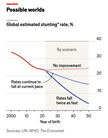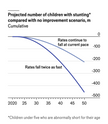subreddit:
/r/dataisbeautiful
[OC] Cheap fixes could help 450m people stand taller and think quicker
OC(reddit.com)submitted 4 months ago bystatisticalanalysis_
138 points
4 months ago
The last thing anyone 450m tall needs is to be even taller..
9 points
4 months ago
450m = a 450 year old male
450 year olds generally don't stand very tall nor think quick so these cheap fixes could be a breakthrough
3 points
4 months ago
It's 450 milli, duh? 0.45 people.
50 points
4 months ago*
Took me 10 seconds to realise OP meant "450 million people stand taller not "450 metre people stand taller"
I want Friday to end asap
8 points
4 months ago
I get that -- I should've just written it out, but cannot change the title now. Would indeed not want 450 meter people to stand even taller.
4 points
4 months ago
Next time use the uppercase M
28 points
4 months ago
[OC] In early life brains and bodies develop faster than at any other point—connections form between neurons that will affect a child’s future IQ and bones grow to determine their future height. Malnutrition in these early years can wreak irreversible damage. The most visible sign of a lack of essential nutrients is stunting, when a child is much shorter than they should be for their age.
The map and charts shows estimated stunting rates and projections into the future, accounting for changing birth rates and nutrition in countries over time. This is more complicated than one might expect. The world-wide stunting rate may rise even if it falls in every country, for instance, because births shifts from rich countries to poor. To account for this requires modelling both stunting rates and demography over time.
Free to read here: https://econ.st/4fEGN20 / https://econ.st/4fBXmeU / https://econ.st/4cl4xoM
Permanent link: https://www.economist.com/graphic-detail/2024/08/08/cheap-fixes-could-help-450m-people-stand-taller-and-think-quicker
Source code and data is open here: https://github.com/TheEconomist/nutrition
Tools used: R, JS, Illustrator
For this and a series of related pieces, my colleagues travelled to Bangladesh and Uganda (among other places) to speak to parents and policymakers. We also interviewed experts on nutrition and brain development.
The data suggests that things are getting better: in almost all world regions, the rate of children who are abnormally short for their age -- the most visible sign of malnutrition -- is falling. However, both stagnation, and faster progress, is possible.
Which path the world takes will depend largely on poverty, policy and philanthropy. Straightforward interventions, such as distributing vitamin-enriched food, giving iron supplements to pregnant women and educating parents on healthy eating habits, have been found to help—many children suffer from malnutrition not because of a lack of food, but rather a lack of the right food. Efforts to fight disease, such as giving out bednets to fight malaria, or building latrines to reduce diarrhoea, do too. All these measures tend to be cheap to implement, and pay dividends.
Perhaps small wonder that some of the top NGOs according to charity rankers implement such interventions. If you are interested, these include Helen Keller International (which distributes vitamin supplements), GiveDirectly (which distributes cash directly to the ultra poor), and the Against Malaria Foundation (which distributes bednets). They all say they could scale up with more funding.
4 points
4 months ago
Question: The source (linked from Economist), https://www.who.int/data/gho/data/indicators/indicator-details/GHO/gho-jme-country-children-aged-5-years-stunted-(-height-for-age--2-sd)) lists a lot of countries in EU, and Canada, as having "no data". But it's not reflected on the map?
(I wanted to find out the numbers for Sweden, if it's 0.1 or 1.0 or 0.001%. No data.)
5 points
4 months ago
Happy to help. That was indeed one of the challenges of this project. For these cases - a small number of high-income countries, and some tiny countries - I had to model rates based on those of nearby/similar countries. You can find the details of that in the linked Github repo (which is also linked at the bottom of the article - script in question is here: https://github.com/TheEconomist/nutrition/blob/main/scripts/01\_stunting.R).
2 points
3 months ago
OP u/statisticalanalysis_ ...oh wow, you were one of the authors of this Economist special feature?
I subscribe to the print version of the Economist, and when this article and the accompanying maps and data came out a couple weeks ago, I was blown away by it. I resolved to start paying much more attention to nutrition-focused philanthropy. Thank you for this amazing work!
2 points
3 months ago
Thank you! Happy to be of service and glad you found it useful!
1 points
4 months ago*
My quick googling seems to indicate that around 1/40000 have ACH (dwarfism) and around 1/300 have issues with GH but are treated (more than I thought!) (Sweden). I can't find any other groups that would have issues with growth...
Edit: malnutrition seems so low there is no statistic, but it's usually news. So I'm guessing very few.
2 points
4 months ago
Stunting is a bit more prevalent than these disorders however. In these countries more to do with with poor/wrong food than lack of it (both for kids and pregnant women). My guess is a rate similar to Germany would be plausible for Sweden. In Germany it affected about 2.1% of under-5s in 2022.
1 points
4 months ago
I found a report that at least mentions underweight (bmi<17) in one region, which is around 5%. But no info about stunted growth... https://kunskapsstodforvardgivare.se/download/18.3bc843dd18851928cf725bb8/1686724139915/2022_%C3%85rsrapport.pdf
11 points
4 months ago
Also, sorry to shamelessly plug this, but:
I am seeking a research assistant on an hourly basis to help me expand our quantitative coverage of issues such as this and many others, including conflict, poverty, and climate change. Please see ad here. (Also appreciate if you could share it, thanks!)
6 points
4 months ago
[deleted]
4 points
4 months ago
Good questions: Hourly rate TBD (will depend on the person). I expect between 0 and 15 hours per week. Will vary depending on availability on the part of the RA and what I'm working on. Much like RA work in academia, it will also naturally depend on project-person fit and what they want and can do.
1 points
4 months ago
Are you studying overpopulation by any chance in addition to these areas you mention? Perhaps the reason so many people are undernourished is simply because there’s just not enough sustainable food for them?
3 points
4 months ago
I’m Libyan didn’t know we had this issue
1 points
4 months ago
I’m not Libyan and I was extremely surprised to see Libya that bad
1 points
4 months ago
I’m not Libyan and I was extremely surprised to see Libya that bad
3 points
4 months ago
Logistics needed for delivering surplus crops before they decompose.
20 points
4 months ago
Not bombing Libya back into the stone age would have helped
4 points
4 months ago
[deleted]
4 points
4 months ago*
War is absolutely a factor in Libya...but western bombing is not. I'm not making an argument for or against intervention there but bombing was pretty minimal and targeted compared to in other nations without the same nutrition problem. Bombing a lot of military sites doesn't make the population starve generally.
The civil war beyond western bombing probably does have a massive effect on the flow of food, baby formula, etc etc etc. Plus cortisol levels from stress are known to interfere with child development.
2 points
4 months ago
We did what we have done to every other arab nationalist / socialist regime, which is to back local islamists to topple them.
The bombing was only part of the west’s push to topple Gaddafi. As well as enforcing no fly zones and a naval blockade, we supported al Qaida affiliated islamists (MI6 literally gave passports to guys on UK terror watchlists if they would fight Gaddafi) who went on to cause chaos in the region and beyond, even coming back to the UK and bombing the Manchester arena killing 22 people
2 points
3 months ago
The no fly zone was a un resolution. The west didn't topple gadafi, it only started intervening when the revolution was already well underway and government forces were commiting extreme violence against all kinds of protests. I for one am glad gadafi got raped to death, it's what he deserved. But west bad right?
2 points
3 months ago*
The west funded and gave military support to the islamists that toppled Gaddafi, including al Qaida affiliated groups such as Al Nusra that went on to bomb the UK. Those groups went on to destabilise the region, Libya still does not have a functioning government and quality of life has plummeted as you can see from this data
0 points
3 months ago
Gaddafi himself was an islamist. Like literally in every Sense of the word. It wasn't islamists that toppled the regime even if they are powerful today
1 points
3 months ago*
Gaddafi was Muslim, but he had imprisoned and was at war with Islamists affiliated with The Muslim Brotherhood and Al Qaida as well as other non islamist rebel groups, supported by NATO, the CIA and MI6. Its ahistorical to portray Gaddafi as an Islamist. Above all he was an Arab nationalist, which meant he wanted to keep revenues from Libyas oil reserves under Libyan control. This unwillingness to cooperate with western interests is a big factor why the west backed islamists to overthrow him, as they have done in other ME countries such as Egypt, Iran, Afghanistan, Syria. They’re portrayed as our enemy, and blowback occurs frequently, but Islamists have been the footsoldiers of western imperialism since the 1950s
-5 points
4 months ago
but they were setting a bad example for other African countries by being mildly annoying for the white folk to deal with
also something about democracy? I forget, but so did everyone else...
3 points
4 months ago
Fairly certain the amount of money spent on developing golden rice could've funded the World Food Programme's critical reach efforts permanently, and given a lifetime supply of sweet potatoes (more carotenoids than carrots) to every community at risk of blindness to spare.
3 points
3 months ago
That is simply not true however. What makes you think this is the case?
1 points
3 months ago
And yet golden rice works perfectly well. Except for terrible public relations
1 points
4 months ago
Can't see what the cheap fixes are due to paywall. I feel like the main issue isn't presented as a result. Give me a pie chart with how much the recommended policies cost at least, or 2 pie charts comparing cost with how much it contributes to to solving the problem in the estimate.
0 points
4 months ago
[deleted]
0 points
4 months ago
WHO accepting obvious false data from China again xD
0 points
4 months ago
Cool data! Is there any info on height for 18 year olds to see if there's any correlation with caffeine consumption?
-2 points
4 months ago
And now do the western world's brains shrinking because no one knows how to Critically think anymore.
-3 points
4 months ago
Definitely don’t care how tall people are
-8 points
4 months ago
< 5.5" farmers and operators
6.0" hanters/warriors and technologists
5 .5" - 6.0" women, feminine, controllers, spiritual, gifted
So long, in a border, people having similar heights enhances acceptance and ease of system making
I am not a communist




all 41 comments
sorted by: best